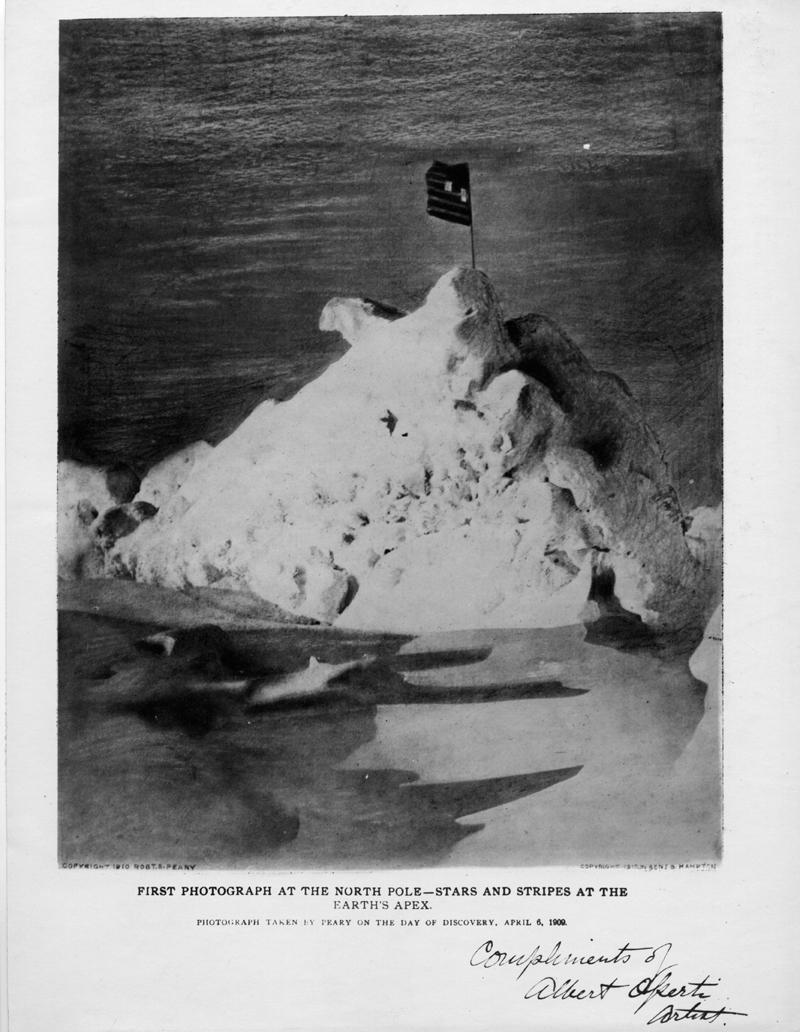Cold Cases: Who Won the Race to the North Pole - Cook or Peary?

This image is supposedly the first photograph of the North Pole taken on the Peary expedition.
Lesson Plan
The question—Who was first to the North Pole?—has been hotly debated, and still is to this day. Dr. Frederick A. Cook claimed that he reached the Pole on April 21, 1908. Cook claimed that drifting ice prevented him and his party from returning to civilization until 1909, when he made his announcement on May 21. In the meantime, Robert E. Peary claimed that he was the first to the North Pole on April 6, 1909. The Frederick A. Cook Society collection contains a wide range of materials on both sides of this controversy. Using selections from this material, students will participate in a mock trial supporting their position of who really reached the North Pole.
Instructional Unit:
Social Studies Skills and Methods
Grade Level:
9th & 10th
Standards:
9.A.1, 9.A.2a-d, 9.A.3a-c, 10.A.1a-c, 10.A.2
Description:
Given primary sources of Cook’s & Peary’s North Pole Expeditions, students will participate in a mock trial supporting their position of who really reached the North Pole.
Duration:
Four Days (4x45min)
Materials and Resources:
- Notepaper
- Pencils
- Sticky notes
- Written Document Analysis Worksheet
- NARA Sound Recording Analysis Worksheet
- Cross-examination worksheet
Warm up activity:
Provide the students a video clip of a contemporary court scene to set the stage for the following activity.
Instructional steps:
Day One
- Explain to students that they are going to put on a mock trial to argue the side of Cook and Peary in regards to their journeys to the North Pole. Teacher will divide class and identify lead counsel for each side (Defense—Cook, Prosecution—Peary).
- Teacher will explain the background of the case—as the judge.
- Teacher will form jury of their choice (parents, other students, faculty etc.)
- Students will listen to the witnesses (Peary/Cook) sworn statements.
- Using an audio recording of Cook and Peary, students will utilize the NARA Sound Recording Analysis Worksheet. - The teacher will hand out the primary sources to both the prosecution and the defense—Pro-Peary or Pro-Cook documents as appropriate. Given the Written Document Analysis Worksheet, students will utilize the primary sources and provide documentation to the worksheet supporting their thesis concerning either Cook or Peary.
- Each group will receive Open Arguments worksheet and use to take information from their document analysis to identify evidence for Opening Argument.
- The teacher will provide any support to the groups as questions arise.
- The teacher will prompt the students on the “Mock trial” format, and establish ground rules for the following day’s activities.
Day Two
- Review the roles of the students, expectations and rules of the “Mock Trial”.
- Opening arguments
- Using the Opening Arguments worksheet - Each group will provide the other with their primary documents so they can review the evidence that their opponents possess.
- Each group will then analyze the new set of documents utilizing the Written Document Analysis Worksheet.
- Students will receive Cross-Examination Worksheet and Closing Arguments worksheet and begin filling out.
Day Three
- Review any evidence analyzed in the previous day.
- Present the case to the jury (students in the audience can present any evidence they found on behalf of either Cook or Peary)
- Rebuttals
- Cross-examination Worksheet - Closing arguments
- Closing arguments worksheet - Jury Deliberates
- The other groups will discuss who they believe who should be awarded the North Pole title.
Day Four
- Review activity of the previous days.
- Verdict will be handed down.
- Have students orally discuss or write an analysis on who they thought really reached the North Pole and why.
- Finish with a discussion on how we should solve problems like this in modern times.
